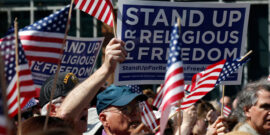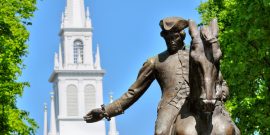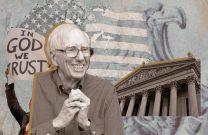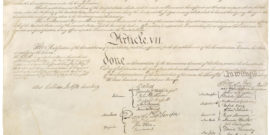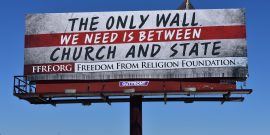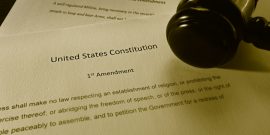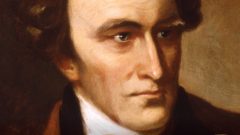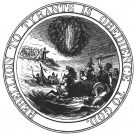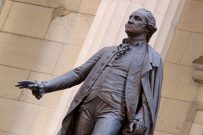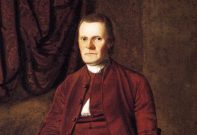Why does Christian nationalism seem more prevalent today than in the past?
Mark David Hall
The Religious Liberty in the States project creates an objective index that measures and compares how well states protect religious freedom.
Europe's right-wing nationalists are increasingly open in their rejection of Christianity.
Contrary to the belief they were deists and atheists, most of the American Founders believed in God’s providence and the natural law tradition.
Conservative legal minds rank the worst twenty Supreme Court decisions of all time.
We should be skeptical of American civil religion. But not every connection between faith and politics falls into that category.
Is a shadowy cabal behind advances in religious liberty? Andrew Seidel's new book doesn't go beyond polemical name-calling.
The Religion of American Greatness offers a reasonable critique of "Christian nationalism" from an insider’s perspective.
Jefferson continues to merit recognition as one of America’s leading founders.
The Establishment Clause was never understood by the Founders to erect a wall of separation between church and state.
Spencer McBride weaves a riveting story of persecution, charisma, and personal ambition.
Had justices faithfully interpreted the Establishment Clause in light of its original public meaning, Lemon's absurdities could have been avoided.
Our Dear-Bought Liberty is the definitive treatment of the Catholic quest for religious toleration in America's early years.
The Pilgrims were not 21st century liberal democrats, but they embraced institutions and practices that helped advance a commitment to republicanism.
Religious liberty is not a trump card that wins every time, but interference with clergy-penitent privilege will do no good and may produce real harm.
Some advocates of public education have made no secret of their desire to impose particular beliefs and values on students.
The win for Little Sisters of the Poor isn't the nightmare the media describes. But in another way, it does point to a dysfunctional constitutional order.
Reilly not only vindicates the founders, he provides arguments that are so strong that a competent grand jury would not even allow the case to go to trial.
The essays in this collection provide excellent reasons for offering substantial protection to what many founders called “the sacred right of conscience.”
There is no reason to believe that the founders’ approach to church-state relations can be understood by careful study of Virginia’s disestablishment.
There is every reason to conclude that Montana's Blaine Amendment violates the Free Exercise Clause.
Religious liberty is well protected today; legislatures often craft accommodations to protect religious minorities. But the struggle is not over.
What the decision in the Peace Cross case on religious symbolism portends is as yet unclear; but some interpretations would lead to perverse results.
Andrew Seidel misunderstands: America’s founders embraced the freedom of religion; not freedom from religion.
Separationism's decline began some 40 years ago, in response to ecumenicalism, social welfare legislation, and the rehabilitation of the Catholic Church.
Rather than continuing to apply the Lemon Test the Court should rely on an accurate account of the founders’ understanding of the Establishment Clause.
This book makes an excellent case that we can better protect LGBT rights without forcing citizens to choose between their job and their religious faith.
There are excellent reasons to oppose state involvement with religion, but originalist arguments are not among them.
If we hope to understand the America founders fully, we simply cannot ignore John Dickinson's arguments about conscience and political restraint.
Seven Justices agreed that the Colorado Civil Rights Commission acted with obvious animus against Phillips’ religious convictions.
In no reasonable sense does Colorado have a compelling interest in requiring this baker to engage in speech to which he has religious objections.
"I know not what course others may take; but as for me, give me liberty or give me death!"
The Supreme Court’s decision in Trinity Lutheran Church v. Comer is a resounding victory for religious liberty.
Washington thought that governmental encouragement of religion was compatible with religious liberty.
one suspects that Ellsworth tends to be left out of the picture because he wanted a less strict separation between church and state than did Madison.
Roger Sherman is important in his own right, but his views on religious liberty are representative of the 50-75 percent of the Founders who were Calvinists
Mark David Hall is a Professor in Regent University’s Robertson School of Government and a Senior Fellow at the Center for Religion, Culture, and Democracy. In 2022-2023, he was a Garwood Visiting Fellow at Princeton University’s James Madison Program and a Visiting Scholar at the Mercatus Center. His most recent book is Proclaim Liberty Throughout All the Land: How Christianity Has Advanced Freedom and Equality for All Citizens.

